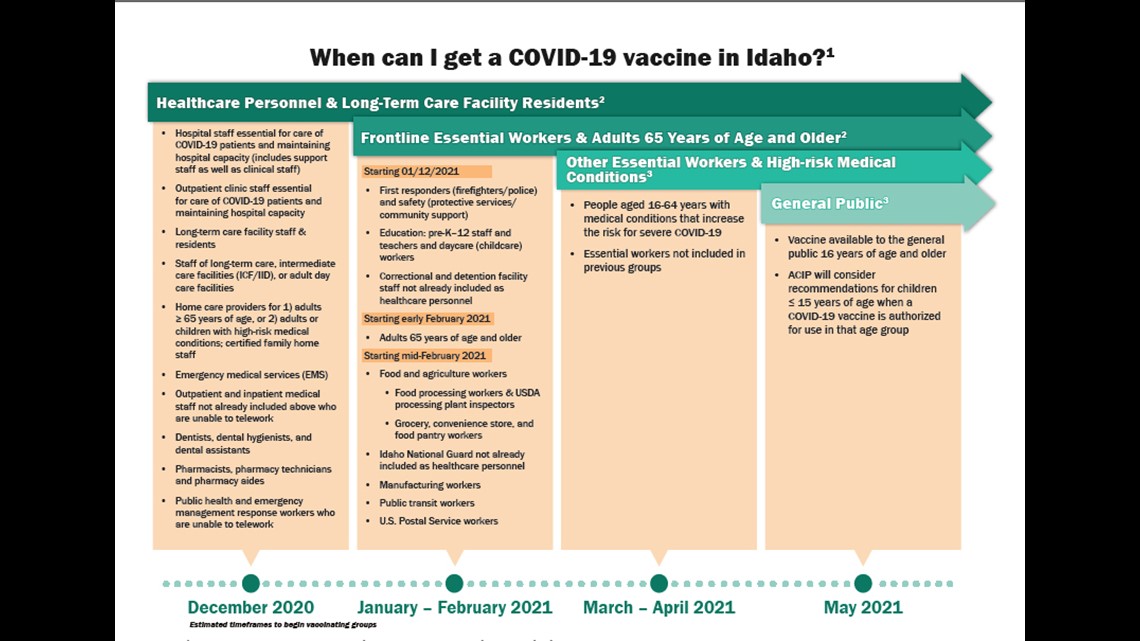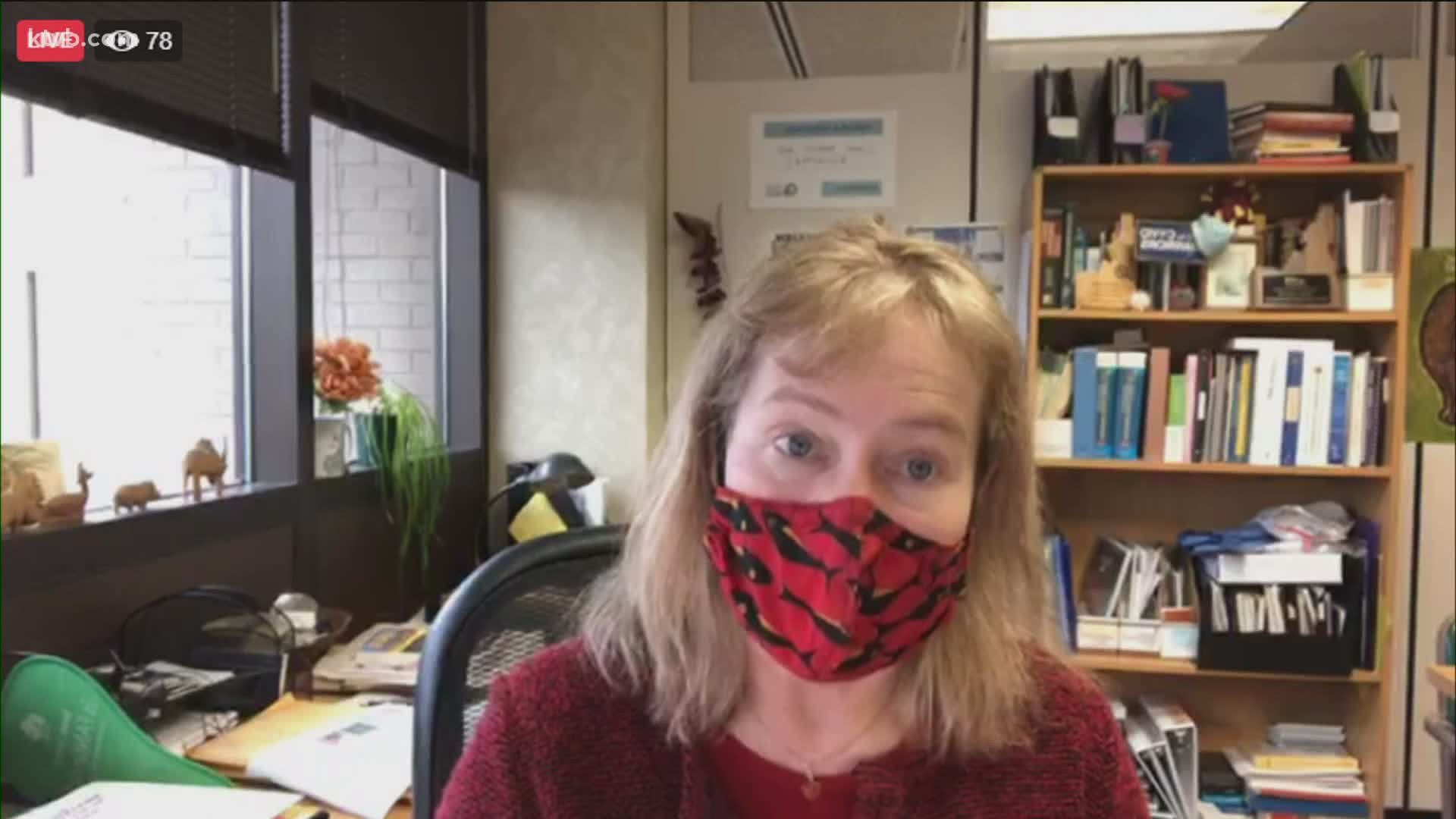BOISE, Idaho — Idaho health leaders say they are working with federal officials to bring more COVID-19 vaccine into the state and get it distributed quickly to those are next in line in the state's distribution plan.
On Tuesday, Gov. Brad Little announced he is adopting the recommendation of the Idaho COVID-19 Vaccine Advisory Committee to make the vaccine available to people 65 and older during Phase 2 of the distribution, which is scheduled to begin in February.
Wednesday morning, state epidemiologist Dr. Christine Hahn hosted a question and answer session on the Idaho Department of Health and Welfare’s Facebook page. She talked about how the state is working to get the vaccine ready and positioned for people in future phases. The state updated the timeline on its coronavirus website. (See chart below)
“We are working to ensure that when seniors' turn comes that there will be vaccine for them,” said Dr. Hahn. “So, come early February when we’re ready to go they will have place to go get it.”
She said most seniors prefer to go to their doctor’s office or local pharmacy to get a shot and they are working to get the vaccine to those providers.
Dr. Hahn was asked by several people who wanted to know if they can make a vaccination appointment for February.
Her response was that it varies on where you live in the state. Some sites may already be taking appointments, but for most people they are going to want to use a new online tool being rolled out by the state next week. It will be a place where Idahoans can go to sign up for vaccines and be notified by local clinics when they become available. More information is forthcoming.


She was asked where Idaho inmates stand in the process. Hahn says the COVID-19 advisory committee has recommended that correctional staff and medical staff, like other medical providers, have already been prioritized. Inmates are not yet in line. However, that could change.
“But we’re very aware that congregate settings are high risk and settings for spread, and the advisory committee will be taking that issue up in an upcoming meeting,” Hahn said.
A teacher asked a question that many Idahoans might be thinking about. She wanted to know if she did not get her vaccine now would she miss her place in line and have to wait for the phase that includes the general public.
“That is not the way this is working. They way that we are rolling this out is, once you’re in an eligible group, and we expand that group, you are eligible going forward,” Hahn said.
“We know some people are going to want to wait more time to think it over or they have a temporary short-term reason why they don’t want to get vaccinated now, but they might want to get vaccinated in a few weeks, that is okay.”
Now that school is starting up again in the new year, Hahn says they recommend teachers consider getting vaccinated as soon as possible because they’ll be in contact with children.
How long do you have to wait between the first and second dose?
Dr. Hahn said she was vaccinated with the Moderna vaccine and did not experience any side effects other than being a little sore in the arm, which is similar to getting a flu shot. She says it takes about four weeks between the doses for the Moderna vaccine and around three weeks for the Pfizer vaccine.
Hahn was also asked about priority groups and why grocery and convenience store workers are placed ahead of people with high-risk conditions.
She says there is no easy way to prioritize people.
“There are essential people that are at high risk of getting exposed because they have to there on site every day, and they’re dealing with a lot of folks including general public, because they need to be protected to keep our society going,” Hahn said.
The advisory committee considered multi options for priority groups at its meeting last Friday.
“I think they felt like this was the best option for Idaho to not only get people at very high risk vaccinated, the people, the seniors who are the highest risk of dying, but also keeping our infrastructure going,” she said.
Do you have to get a second dose in order to be protected from the virus?
Hahn says it is still too early to say how protected people who only get one dose of the vaccine are, and for how long. Of the two vaccines that have been authorized for use, both were studied as a two-dose regimen.
“One of the reasons for that second dose is to prolong, strengthen that immune response so hopefully it lasts longer,” Hahn said. “But for right now, I would highly recommend getting doses to ensure that you are getting the best protection that the current science supports.”
Hahn says the state has learned a lot since they began administering the vaccines to healthcare workers last month. We now know that some people might have an allergic reaction and should wait for 30 minutes after getting a shot.
“Now that we’re expanding to bigger populations we’re absolutely looking at who can potentially provide this vaccine in a more mass clinic type of way, maybe expanded hours and start really increasing the number of people that can get vaccinated,” Hahn said.
That’s already happening in some states, and Hahn says Idaho is starting to have those conversations and will hopefully get there. Right now, the vaccine supply in Idaho has not been high enough to do these type of mass clinics.
Facts not fear: More on coronavirus
See our latest updates in our YouTube playlist:

